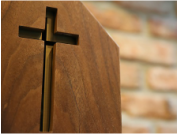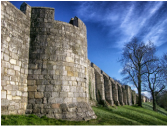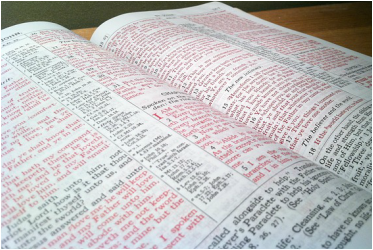|
Today's lessons covers a prophecy against Judah culminating in its destruction and a promise of redemption to those who are faithful. Isaiah Chapter 22 Lessons from the text In verse 14, God tells Isaiah that the Jews' iniquity will not be purged from them until they die. I would hate to have to die before I realized that I had messed up my life. Yet that is exactly what is happening to most people today. In America, just about everybody has at some point heard the Gospel. Through TV, the internet, the local churches, and the body of born-again believers, our culture is full of the witness of Christ. My family never attended church, did not partake of any religious event, yet through Christmas carols and different movies I was still exposed to the Christian faith. But how many people listen? I first really heard the Gospel from my college roommate who would talk with me about who God is and how we relate to Him. Because she was willing to live out her faith in front of me, I realized that there might be something to what she believes. If she had not challenged my reality, I may never have come to Christ. Yes, the Christian faith is all throughout our society, but it takes seeing born-again believers living out their daily lives to make people stop and think about what they are doing. As our culture takes a turn towards sin, accepting as common more and more sinful things, the Christian community appears to be pulling away. The Muslim and Jew are allowed to pray openly in public and wear special apparel to their jobs because their religion requires it, yet praying in the name of Jesus is forbidden at public events. Christians have become intimidated by this recent suppression of our faith, and the result is devastating. If you are a sinner surrounded by sinners, why would you change? If you are a drunkard and everyone drinks, why would you think you are doing anything wrong? Why get married when everyone is living together to "try it out" first? As sin becomes commonplace, no one wants to change. It never enters their mind to change. It never entered my mind because I was just doing what I saw everyone else doing. We, the Christian community, have an obligation to be like my college roommate. We must live out our lives in the most godly fashion we can as a witness to the life and death of our Lord Jesus Christ, and, when we meet someone who does not know the Lord, be willing to talk to them about spiritual matters. Otherwise, the people around us may never realize there is a better way of life until it is too late and they stand at the judgment seat before a Holy God. Verse by Verse Commentary 1 God calls to the people of the valley of vision (Jerusalem, for from it originates all visions from God) to see why they are panicked. People would go to their roof top to see what was coming as well as to be able to defend themselves. 2 Even though it is a time of war, the men are not slain. This causes some joy despite all the tumult. 3 The reason people are not slain is because they are being taken captive. Since the rulers will flee together, this most likely refers to the second Babylonian exportation. II Kings describes the scene where all the chief rulers and the king's house try to escape from Jerusalem but are overrun and taken captive by Nebuchadnezzar's forces (25:1-7). 4 God is not pleased with the spoiling of Jerusalem. It hurts Him so much that He will not be comforted. God is not actively punishing His people; He is allowing them to reap the consequences for their actions. By disobeying and leaving God, they have lost His protection and are now vulnerable to enemy attack. 5 While God is allowing the Jews to be perplexed and troubled by the results of their choices, He is still sovereign over all of Creation. Ultimately, He takes all responsible. The breaking of the walls again points to Nebuchadnezzar's second attack on Jerusalem in 587BC (II Ki 25:8-10). 6 Kir and Elam were cities of Moab located in what is now modern day Iran. 7 God says that the siege against Jerusalem will be so vast that all of the valleys surrounding it will be covered by enemy forces. Nebuchadnezzar's second siege lasted almost thirty months and involved forces from multiple nations which Babylon had already conquered. 8 The defeat is likened unto becoming naked. God uses this phrase to refer to the sins of Judah being revealed (Isa 3:16-24). The armour of the house of the forest is the king's house which was made of cedar from the forest of Lebanon (I Ki 7). 9-11 After Jerusalem rebelled against Babylon and subsequently was conquered a second time, Nebuchadnezzar utterly destroyed the city. Yet in all this tumult, the Jews do not cry out to God. 12 Shaving the head and sitting in sackcloth are signs of extreme grief and mourning. 13-14 As verse 11 says, the Jews of that time would not turn to God in their time of distress. Instead, they would decide that since they were going to die anyway, they would party it up while they could. God tells Isaiah that this sin is rooted so deeply in the Jews that it will take death before they wake up and realize their error. 15 Shebna was the royal scribe during Hezekiah's reign and was known to Isaiah (II Ki 18:37-19:2). It is unclear whether this vision occurred before or after the incident in II Kings. 16-17 Isaiah is to ask the scribe why have the people prepared a grave for themselves, and not just any grave, but a lofty grave as if they are a mighty people of renown. To the contrary, God says they are lowly as slaves and will be covered by (or completely taken under the care of) their enemies. 18 The Jews will be treated roughly to the point that they feel ashamed to have trusted in their own might. This was certainly fulfilled with Nebuchadnezzar's destruction of Jerusalem. Since Judah had already rebelled, the king did not want to leave any shred of Jewish strength or dignity to encourage a second rebellion. 19 God now takes responsibility for Judah's fate, saying that He will exile them. Noteworthy is that while God kicks them out of their homes, it is the Babylonians who will pull them down. When we sin, we loose our place in fellowship with God and are left to the mercy of our environment. Judah's rebellious attitude left them in quite an unfavorable position in the eyes of Nebuchadnezzar. This verse is directed at the Judah as a nation and to the king alone. 20 Eliakim was over the king's household and he, too, was known to Isaiah (II Ki 37-19:2). Even though Judah as a whole was in sin, Eliakim is called a servant of God. Even while God is judging a nation, He recognizes and spares individual believers. 21 Because Eliakim has been faithful, God says he will be a father to Judah. His faith and knowledge of God will make him the instructor and guide to the people, the one to care for them and to help them grow spiritually. Noteworthy is the fact that God will strengthen and cloth him with the robe and girdle of the one who will have just been removed from his position of power. In other words, Eliakim would replace the king as the sovereign voice in Judah. 22 The keys of the House of David means that Eliakim will have control over the royal position. Eliakim the son of Hilkaih (of whom this prophecy is concerned) is not to be confused with Eliakim the son of Josiah who was renamed Jehoiakim (II Kin 23:34). As the Eliakim of this prophecy was never made king, this and the following verses switch to a prophecy about Christ. Eliakim is a Christ-type, or person or bears one or more elements of Christ (Moses and Joseph are two other Christ-types). The power over the doors symbolizes the complete sovereignty of Christ; no one can undo what He does. 23 Christ is immovable from His position. He is and will continue to give glory to God the Father by His righteous rule. 24 Not only will His rule honor God, but all the people will give Him honor. We now uplift Jesus as our Lord and Savior, thus elevating Him in glory. Also, everything will be given to Him, both all the people and all the material objects. In Matthew 28:18, Jesus says that He has been given all authority in heaven and earth. 25 There are two interpretations of this verse. The Jamieson, Fausset, and Brown Commentary states that this refers back to the one who was supposed to be in the sure place, Shebna, who would loose all his rank in the siege against Jerusalem and all who were dependent on him (the burden) would be broken. However, this verse could also be pointing the Christ's death. Even though He had all authority at the time of His crucifixion, He allowed Himself to be smitten (Zech 13:7, Mt 26:31). The burden placed upon Jesus was the sins of the world, and they were cut off with His sinless sacrifice and offering of His blood for atonement, cast as far as the East is from the West (Ps 103:12). ___________________ Please comment below to tell us what you learned from today's lesson.
0 Comments
Leave a Reply. |
Devotional Categories
All
Archives
September 2023
|
|
Join my mailing list!
|
Thank you!You have successfully joined our subscriber list. |
|
© 2024 Melissa Beaty
|
